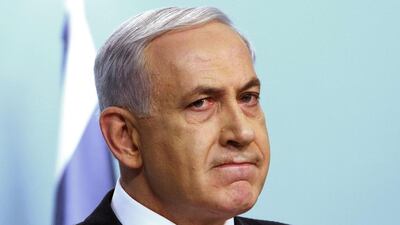Former Israeli defence minister Moshe Yaalon is angry. The popular Israeli politician was unceremoniously forced out of Benjamin Netanyahu’s government in May and replaced with the far-right political demagogue Avigdor Lieberman. In a speech to a security conference last week, Mr Yaalon went on the offensive against his old political ally.
The former number two in the Israeli government accused Mr Netanyahu of using the Iran nuclear threat for fearmongering. He said that Netanyahu and other government ministers also embellished the threats posed by Hamas and Hizbollah as a diversion from serious challenges in Israeli society, namely the rise of the extremist right wing in the Israeli parliament.
His exact comments were damning and worth repeating. “At this time and in the foreseeable future, there is not an existential threat to Israel,” Mr Yaalon told the conference.
“Israel is the strongest state in the region and there is an enormous gap between it and every country and organisation around it. Therefore, it is appropriate for the leadership in Israel to stop scaring the citizens and to stop telling them that we are on the verge of a second Holocaust.”
Mr Yaalon was attempting to establish a difference between his politics and that of his former allies (he also announced that he would be running to replace Mr Netanyahu as prime minister in the next election). But it is striking that he is going after the sacred cow of Israel’s public relations establishment. Despite having an unparalleled military machine and countless nuclear weapons, Israel maintains an air of weakness and fragility.
This strategy has worked well for Tel Aviv. Many Israelis actually believe that they are the victims of the West Bank occupation because they are forced to send their children to enforce the domination of another people. Perceived victimisation has allowed Israel to raise massive amounts of military aid from the United States.
Now, Mr Yaalon has broken ranks and is publicly criticising the narrative of Israeli victimhood. He is the latest official to state that Iran’s nuclear programme “has been frozen in light of the deal signed by the world powers and does not constitute an immediate, existential threat for Israel".
From an Israeli perspective, Iran’s long arm in the region matters less than its ability to manufacture and use nuclear weapons.
After Mr Netanyahu’s famous cartoon bomb speech at the United Nations in 2012, Israel’s leadership attempted every political manoeuvre imaginable to convince the United States that Iran would lead a second Holocaust if it obtained weapons of mass destruction.
Through its American lobbying arm, the American-Israel Public Affairs Committee, Tel Aviv spared no resource in staking the claim that a nuclear Iran could spell the end of Israel. Aipac reportedly spent more than $20 million (Dh73m) trying to defeat the Iran deal in Washington.
In a disrespectful breach of diplomatic protocol, Mr Netanyahu campaigned against president Barack Obama’s 2012 reelection bid on American news programmes by using the Iran threat as evidence of his failings. Netanyahu’s attempt to derail the Iran deal failed.
Now that Iran is off the table (at least for the moment), Israel is having to recycle old threats to stoke fear and divert attention from its colonisation project in Palestine.
After the government granted hundreds of Israeli extremists access to Al Aqsa Mosque compound in Jerusalem in October, Palestinians renewed regular attacks on Israeli civilians and soldiers.
The shooting attack in Tel Aviv this month thrust Palestinian unrest back into the Israeli psyche, while the Iranian threat has been duly shifted to the back burner having served its purpose for the time being.
The goal of every Israeli government since the founding of the country has been the colonisation of the land, the entrenchment of the occupation (from 1967 onward) and the growth of Israel’s military capabilities through aid and experience.
Existential threats – from Arab countries, Palestinians or Iranians – have been deftly used to generate international support for the conquest of land. Whether it was his intention or not, Mr Yaalon confirmed these long-standing aspects of Israeli statecraft last week.
Indeed, Israel’s settlement project in the West Bank has intensified over the past decade as the country’s leadership has been speaking about destruction at the hands of the Iranians.
Internally, scapegoats have played an important role in colonial societies especially in situations rife with ethnic and religious fault lines that preclude deep political unity. Israel, which claims to represent all Jewish people, has no broadly accepted definition of who is a Jew and thus requires such scapegoating. For purposes of marriage and civil status issues, one is Jewish according to the rabbinic directive of following the mother’s lineage.
For matters of citizenship, one is considered a member of the faith according to the Nazi Nuremberg laws that trace lineage by the religion of one grandparent. Such a distinction is critical in a country with over one million Russian Jews, who don’t enjoy the full benefits of citizenship because their mothers were not Jewish.
As such, the ever present threat of an outside enemy, such as Palestinians or Iranians, is a critical source of unity in society. All Israelis can circle the wagons and fight off Palestinians but once that threat goes away they might turn on each other. From this perspective, peace is almost more dangerous to the social cohesion of Israel than constant war.
Is Mr Yaalon ready to reform this aspect of Israeli sociology in his bid for the prime minister’s office? Probably not but regardless of his motivation, his recent comments are evidence of dark patterns in Israel.
jdana@thenational.ae
On Twitter: @ibnezra

